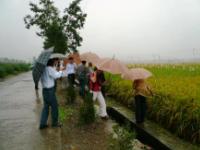MENU

|
| FNCA 2001 WORKSHOP ON MUTATION BREEDING |
|
Workshop-FNCA2001Plant Mutation Breeding
and
Biofertilizer Discussed Together
|
|
written
by Dr. Siranut Lamseejan
|
|
|
|
Prof. Dr. Siranut Lamseejan
Head, Gamma Irradiation Service and Nuclear Technology
Research Center (GISC), Kasetsart University |
|
| |
The 2001
FNCA workshop on the Application of Radioisotopes and Radiation for Agriculture
Use was held from August 20-24, Bangkok, Thailand. The Workshop sponsored
by the Ministry of Education, Culture, Sports, Science and Technology (MEXT),
the Kasetsart University (KU), the Office of Atomic Energy for Peace (OAEP),
and Department of Agriculture (DOA) acted as local host and the organizer
with the cooperation of Japan Atomic Energy Research Institute (JAERI) about
the Ministry of Agriculture, Forestry and Fisheries (MAFF) of Japan, the
Japan Atomic Industrial Forum(JAIF) as the coordinator.
Fifty one people from eight countries i.e. Japan, China, Indonesia, Korea,
Japan, Malaysia, the Philippines, Thailand and Vietnam attended the Workshop.
The Workshop consisted of two main aspects – plant mutation breeding
and biofertilizer. |
| |
|
Opening Ceremony at the Workshop |
|
| |
1.
Plant mutation breeding :
Eleven papers including three invited papers were presented. The important
topics presented and discussed comprise the following - molecular biological
techniques, screening rice starch mutants, biotechnological approach in
crop improvement, molecular techniques in orchid mutagenesis, induced mutation
and marker assisted breeding techniques, rice gene discovery, molecular
detection of variation in horticultural crops, in vitro acute and chronic
irradiation in chrysanthemum.
Round table discussion on regional cooperation, review and discussion of
past activities and application of radioisotopes for agriculture was conducted.
Exchange of opinions among participants on further regional cooperation
in the field of plant mutation breeding was actively encouraged.
The Phase II activities were summarized as follows :
The draft of regional cooperation plan on application of radiation and radioisotopes
for agriculture will be incorporated into the Third Coordinators Meeting
to be held in Japan in 2002. Summary of Phase II activities was presented
by each participating country.
Mutation Breeding Database will be published on FNCA homepage. The final
draft of the Mutation Breeding Manual will be submitted at the next Workshop.
Mutation Stock Repository was successfully initiated by Thailand and the
Philippines.
The basic theme for Phase III was agreed to be entitled “Technique
on Reproductive Pattern”. The topic for the next Workshop is “vegetatively
propagated crops and radiation breeding” which will be held in China
in September 2002.
The Phase III activities were proposed as follows :
The basic theme will be divided into three sub-themes, i.e., vegetatively
propagated crops (2002), root crops (2003) and clonally propagated crops
(2004).
The multilateral research program will be comprised of draught tolerance
in sorghum, sugar cane and soybean (2002 onward), and three other topics
were also discussed. |
|
2.
Biofertilizer :
Invited lectures from Thailand and Japan together with country reports from
participating countries were presented and discussed.
The highlight of lectures and the presented papers dealt with rhizobium
inoculation of red kidney bean, biofertilizer production and utilization,
symbiotic nitrogen fixation in leguminous plants and the genetic discovery
of Bradyrhizobium in soybean. A project with the goal to increase crop production
in Asia by the efficient use of rhizobia for sustainable agriculture was
formulated. In addition, proposals and implementation schedule were discussed
and planned which include selection of effective microorganism (2002), improvement
of inoculant (2003), improvement of soil microbial activities (2004), field
trial (2005) and economic analysis (2006).
The venue for the next meeting was suggested to be held in China. The publication
of a newsletter was agreed and the Japanese secretariat of the biofertilizer
project was assigned as editor.
Concluding remarks by the 2001 FNCA Workshop was that the Philippines will
be the host for the 2003 FNCA Workshop on plant mutation breeding and biofertilizer. |
| |
|
|
Participants visits to the Gamma Irradiation
Service and
Nuclear Technology Research Center at the Kasetsart University |
|
page top↑ |